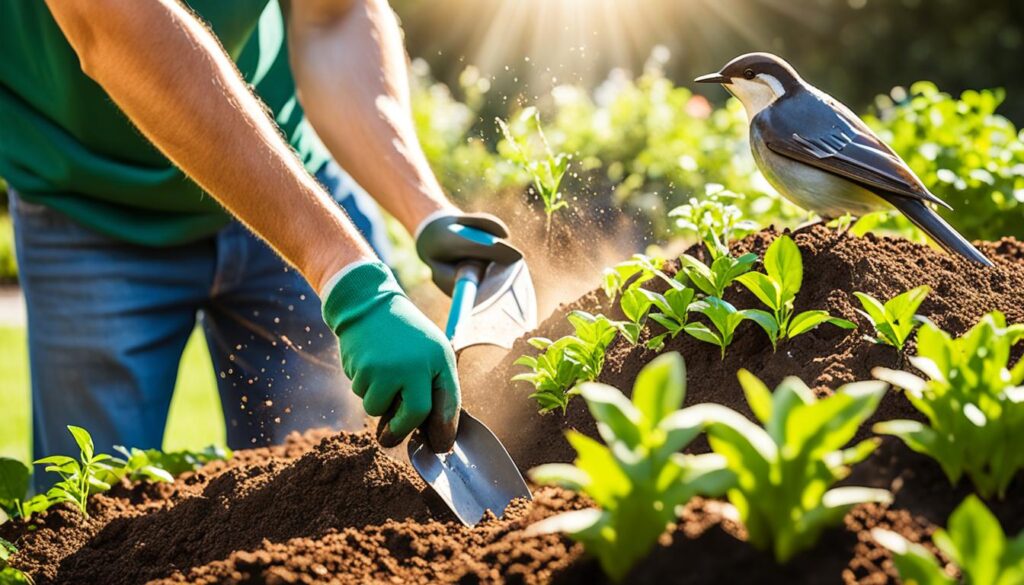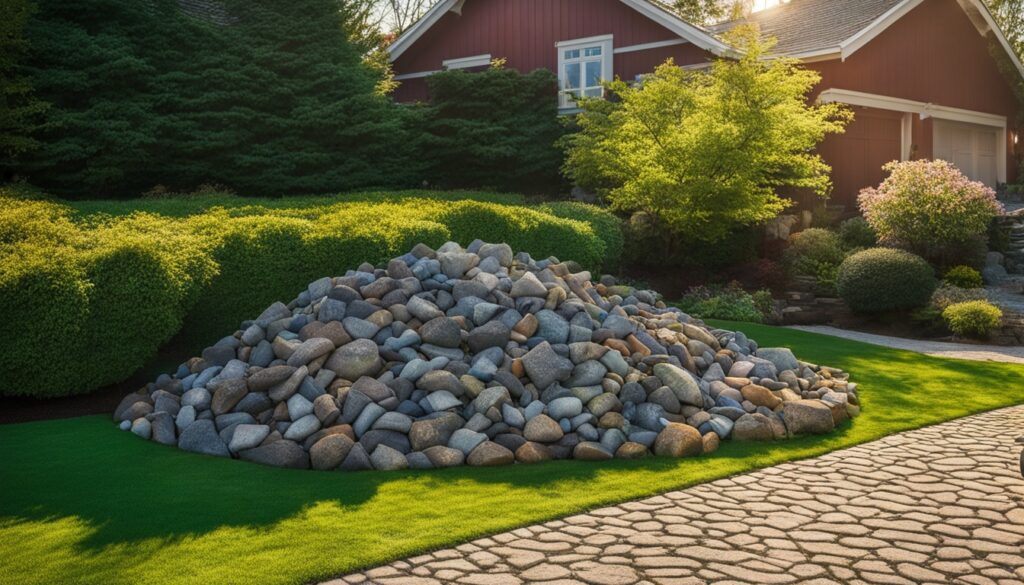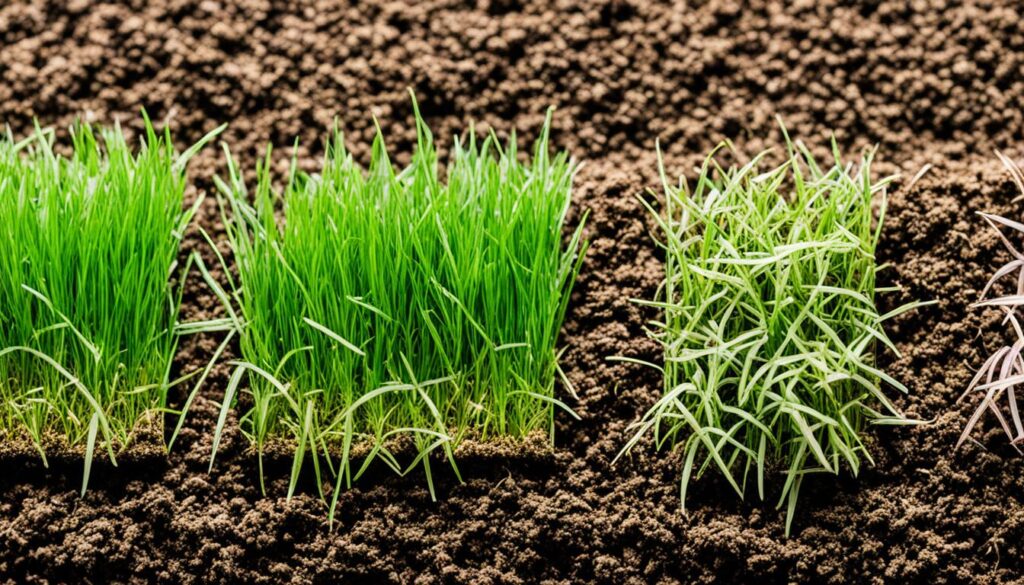Did you know a single community garden can draw over 1,000 pollinators? This shows how vital gardening is for our ecosystems. It’s more than just a hobby; it’s a key part of being human. It greatly affects our health, the planet, and our everyday lives.
We’ll dive into what gardening truly means and why it’s so important. It connects us to nature in a way that’s unique to humans. The benefits go way beyond the garden itself.
Key Takeaways
- Gardening has a “certain universal appeal” and is intrinsic to human appreciation of the natural world.
- Gardening provides benefits for health, the environment, and personal sustainability.
- Earth-friendly gardening practices can benefit the environment and the gardener.
- Gardening offers a connection to nature that can have profound impacts on our well-being.
- Gardening is a versatile activity that can be enjoyed by people of all ages and abilities.
Introduction to Gardening
Definition and Universal Appeal of Gardening
Gardening is about growing plants, flowers, veggies, and more. It’s a timeless hobby that many people love. It can be done on a small scale, like in pots, or on a big scale, like the Versailles gardens.
Gardening has been around for thousands of years. Early humans started growing plants about 23,000 years ago. Indigenous peoples in the Americas have gardening traditions that go back a long time. They used over 311 different plants for food and medicine.
Many common foods like maize, quinoa, and pumpkin come from these early gardens.
An Innate Human Connection with Nature
People have always felt a deep bond with nature through gardening. Since World War II, more people in Western countries have taken up gardening. They want to be self-sufficient and find gardening relaxing and healing.
Gardening lets you be a designer, artist, technician, and scientist all at once. It’s easy to fix mistakes in gardening because nature covers them up. This makes gardening fun for people of all ages and skills.
“Gardening is a relaxing and therapeutic pursuit, especially in the context of the hustle and bustle of modern life.”
The Importance of Gardening
Gardening is more than just a hobby. It brings many benefits for our health, the planet, and our daily lives. Let’s see why gardening is so important and how it can change our lives.
Benefits for Health, Environment, and Sustainability
Gardening is great for our health. About 80% of Americans lack enough vitamin D, which you can get from sunlight while gardening. It also boosts your heart health and strengthens your muscles and bones through gardening activities.
It’s not just good for the body. It’s also good for our minds. Being outside lowers blood pressure and heart rate, helping us relax. Kids who garden make better friends and are less likely to fight, showing its benefits for social skills and behavior.
Gardening helps the environment too. It creates homes for wildlife, supports many species, and locks away carbon. By growing your own food, you cut down on pollution and food transport, helping the planet.
| Gardening Benefits | Health | Environment | Sustainability |
|---|---|---|---|
| Vitamin D Synthesis | ✓ | ||
| Cardiovascular Fitness | ✓ | ||
| Stress Reduction | ✓ | ||
| Improved Social Skills | ✓ | ||
| Habitat Provision | ✓ | ||
| Carbon Sequestration | ✓ | ||
| Reduced Food Miles | ✓ | ✓ |
Gardening is a powerful activity that benefits our health, the planet, and our way of living. By enjoying gardening, we can live healthier, more balanced lives that are also good for the earth.
Gardening and Personal Health
Gardening greatly benefits both physical and mental health. Being outdoors, it offers more vitamin D and low-impact exercise. This can boost heart health. Gardening also lowers stress and may prevent dementia.
Physical and Mental Health Advantages
Gardening is a moderate exercise, burning about 330 calories per hour. This is more than walking at a moderate pace. It helps prevent high blood pressure, as advised by health experts.
Gardening also helps with depression and anxiety, says a 2017 study. It can lower dementia risk, making it a great health practice.
Vitamin D, Low-Impact Exercise, and Stress Relief
Gardening is a simple way to eat more fresh fruits and vegetables, boosting health. Spending half an hour in the sun can give you 8,000 to 50,000 IU of vitamin D. This vitamin is key for strong bones and a healthy immune system.
Gardening works out many muscles, from easy to hard exercises. Experts suggest taking breaks, drinking water, and making gardening easy to avoid strain. Gardening helps with stress recovery, showing better results than reading after stressful events.
Gardening and Emotional Well-being
Gardening is more than just a hobby. It deeply affects our emotional well-being and mood. Studies show that being in the garden boosts happiness and satisfaction with life. This might be because certain soil bacteria help increase serotonin in our brains.
Mood-Boosting Effects of Gardening
Gardening and horticulture make us look at life more positively. A study in the Journal of Environmental Horticulture found many psychological benefits. These include less anxiety and stress, less depression, and more happiness and satisfaction with life.
Gardening also helps with PTSD, improves memory, and boosts creativity, productivity, and focus.
The Role of Soil Bacteria in Increasing Serotonin
Gardening has a calming effect that can change how we feel, says Jayla Fry from Texas A&M AgriLife Extension Service. This might be because of soil bacteria that raise serotonin levels in our brains. Serotonin helps control our mood, so more of it means we feel better and more content.
“Gardening can provide children with a sense of accomplishment, pride, and ownership,” emphasizes Randy Seagraves, the Junior Master Gardener Program coordinator.
Gardening is great for people of all ages and backgrounds. It can be done in a private garden or a community plot. The emotional benefits of being in nature and doing something hands-on are clear.
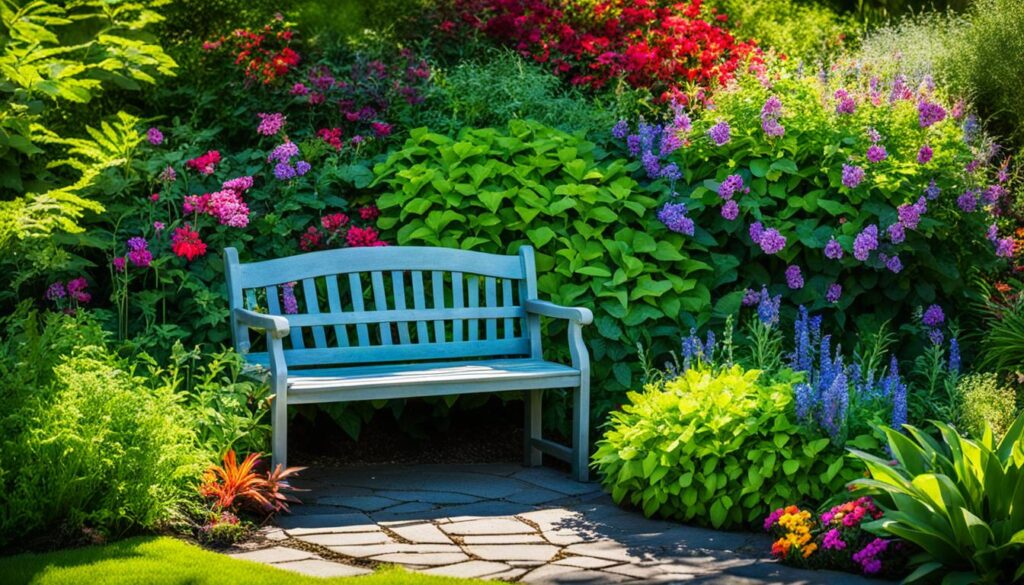
Environmental Importance of Gardening
Gardening is more than a hobby; it’s key to a healthy planet. Studies show that gardens are important homes for many animals. They give birds, insects, and others a safe place to live, away from city life. Gardening also helps biodiversity and pollinators, like bees, which are vital for our planet’s health.
Gardens as Natural Havens for Wildlife
In cities and suburbs, gardens are often the last places where many animals live. They offer food, water, and shelter to many creatures, from birds to butterflies. By using native plants and avoiding harsh chemicals, gardeners make spaces that support wildlife.
Promoting Biodiversity and Pollination
Gardening is great for promoting biodiversity and helping pollinators. By growing native plants, gardeners give bees and butterflies lots of nectar and pollen. This helps the whole ecosystem, as pollinators are key for many plants to reproduce.
| Benefit | Impact |
|---|---|
| Reduced chemical use | Organic gardening cuts down on chemicals, helping plants, animals, and people. |
| Air and noise pollution reduction | Gardens make the air and noise cleaner by producing oxygen and soaking up sound. |
| Habitat provision for wildlife | Birds and wildlife find homes in gardens, even in cities. |
| Carbon footprint reduction | Growing your own food in a garden cuts down on carbon emissions by avoiding long transport. |
| Waste reduction | Using recycled and reused materials in the garden, like composting, lowers waste and methane emissions. |
Gardening’s impact goes beyond our yards. It helps create diverse habitats and supports wildlife and pollination. Gardeners are key to keeping our ecosystems balanced.
“Gardening is not just a hobby, but a vital part of maintaining a healthy environment. By creating diverse, natural habitats and promoting the health of vital wildlife and pollination processes, gardeners play a crucial role in maintaining the delicate balance of our ecosystems.”
Community Benefits of Gardening
Gardening is more than just a hobby; it’s a way to build a stronger community. Community gardens let neighbors meet, work together, and share their love for plants.
Building Togetherness through Community Gardens
These gardens are where people can make new friends, share tasks, and learn from each other. By working together, they build strong bonds and a love for their community. Studies show that these gardens can cut down on depression by up to 60% and reduce gun violence by 20% or more.
Community gardens also tackle food insecurity by letting families grow their own food. This cuts down on grocery costs and boosts self-confidence. Plus, they help fight environmental issues like pollution by creating green spaces in cities.
“Community gardens bring people together and foster a sense of community that might not otherwise exist. It’s a shared experience that creates connections and a shared sense of purpose.”
But the good stuff doesn’t stop at the garden. Being part of a community garden makes people feel more connected, boosts their health, and deepens their love for nature. In a world that often feels apart, gardening brings people closer, one plant at a time.
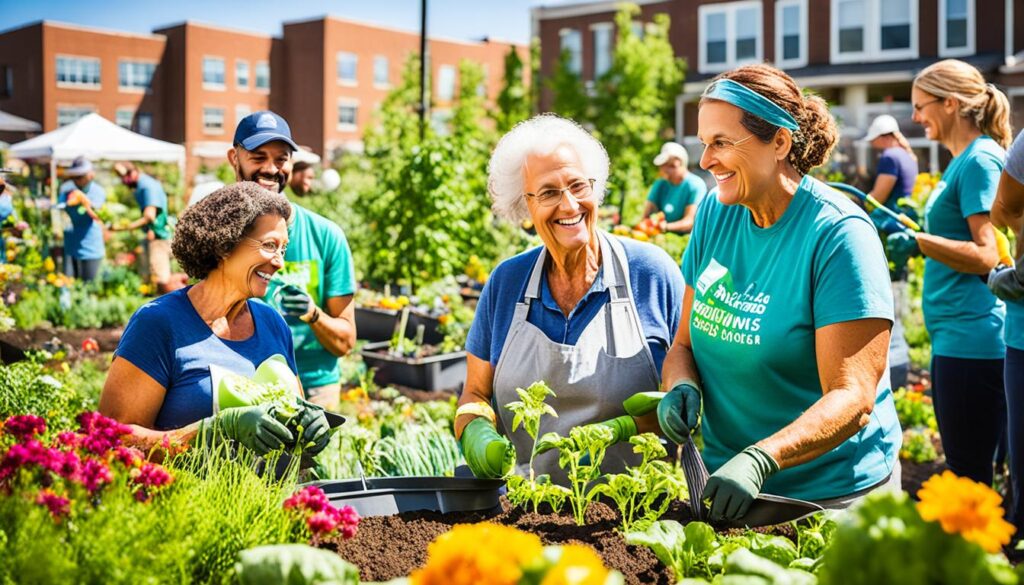
what is gardening and its importance
Gardening’s Impact on Daily Life and Sustainability
Gardening changes our daily lives and helps the planet. By growing our own food, we cut down on the harm caused by long food transport. This makes our lifestyle greener and gives us fresh, healthy food while saving money.
Gardening makes us more self-sufficient. It lets us control what we eat. This bond with nature and growing our own food brings us closer to the earth and makes us feel fulfilled.
Reducing Environmental Footprint and Food Miles
Growing our own food cuts down the environmental footprint and food miles. This helps the planet and gives us the freshest, most nutritious food.
| Benefit | Impact |
|---|---|
| Reduced Environmental Footprint | Less greenhouse gases, water use, and waste from big farms and long food transport. |
| Shorter Food Miles | Food travels less from farm to table, lowering carbon emissions and giving us tastier produce. |
| Healthier Eating Habits | Growing our own food leads to a healthier diet and less reliance on packaged foods. |
Gardening’s importance goes beyond personal gains. It’s key to a sustainable future for our communities and the earth.
Gardening and Family Bonding
Gardening is a great way to strengthen family ties and share traditions. By letting kids help with the gardening process, parents and grandparents teach important lessons. These lessons include responsibility, the value of nature, and the happiness of growing things. Gardening also lets families share skills, stories, and a love for the earth. This creates memories and traditions that last for years.
Teaching Children Responsibility and Nature Appreciation
Gardening is a learning tool for kids. It teaches them about plants, the earth, and caring for living things. By working in the garden, kids learn to take care of the planet. Plus, they get to try new fruits and veggies, which helps them eat healthier and appreciate nature more.
Passing Down Gardening Traditions
Turning gardening into a family tradition builds strong bonds. It doesn’t matter if it’s outdoor or indoor gardening. These activities let families work on creative projects together. This helps improve communication and problem-solving skills and lowers stress for everyone.
“Gardening as a family activity fosters a close relationship among family members, and spending quality time together in the garden helps in creating a meaningful experience for everyone involved.”
By adding gardening family, children, responsibility, nature appreciation, and traditions to our lives, we strengthen our bonds. We gain a deeper understanding of nature and create memories that last through generations.
| Benefits of Family Gardening | Statistics |
|---|---|
| Fosters close relationships among family members | 87% of families reported feeling closer and more connected after engaging in gardening activities together. |
| Teaches children responsibility and appreciation for nature | 65% of parents noticed an increase in their children’s interest in nature and the environment after involving them in gardening tasks. |
| Promotes healthy eating habits | Growing a garden together encourages children to try new fruits and vegetables. |
| Decreases stress levels | 72% of families experienced a decrease in stress levels after spending time gardening as a family. |
| Develops better communication and problem-solving skills | Families who participate in gardening together are 30% more likely to have better communication and problem-solving skills. |
Adaptability of Gardening
Gardening is a hobby that everyone can enjoy, no matter their age or ability. As we get older or face physical challenges, gardening can change to fit our needs. It can be a hobby we keep enjoying for life. With raised beds, container gardening, and special tools, gardening has many ways to adapt for different gardeners.
Using raised beds or elevated planters makes gardening easier by reducing bending and kneeling. Cloth containers help plants grow strong roots but need more watering. Ergonomic tools with special handles also help prevent pain while gardening.
Choosing easy-care plants and native species makes gardening even better. These plants draw in helpful insects and birds, cutting down on work like mowing. Getting advice from local garden centers or extension services helps make gardens easier to maintain and more welcoming to wildlife.
With creativity and planning, gardening can be made to fit anyone’s physical abilities. Tools like reach extenders and wagons for wheelchairs help. Or, you can ask family and friends for help. Gardening stays a flexible and long-lasting hobby for everyone.
“Gardening is an endlessly adaptable hobby that can be enjoyed by people of all ages and abilities.”
Gardening and Personal Growth
Gardening can change a person in big ways. It teaches us about patience as we wait for seeds to grow and flowers to open. It also makes us stronger, teaching us to bounce back from problems.
Gardening makes us feel closer to nature and helps us see the beauty in things that aren’t perfect. By living with nature’s ups and downs, we learn to accept life as it comes.
Cultivating Patience, Resilience, and Mindfulness
Gardening needs a lot of patience and persistence. It teaches us to keep going even when things are tough. It also helps us connect with nature and value the beauty of being different.
Embracing Imperfection and Nature’s Lessons
Gardening shows us that nature is full of imperfections. It teaches us to accept the ups and downs of life. We learn to be flexible, understand growth and decay, and see beauty in surprises.
“Gardening is not just a hobby, it’s a way of life that teaches us to appreciate the beauty in the imperfect and the resilience to overcome obstacles.”
Conclusion
Gardening is more than just a hobby. It benefits individuals, communities, and the environment in many ways. It improves our health, helps the planet, and brings people together.
It’s a way of life that enriches us in many ways. Gardening offers physical and mental health benefits. It also lifts our mood and helps the environment and communities.
As we face modern challenges, gardening can be a powerful solution. It gives us a sense of purpose and connects us to nature. By gardening, we care for plants and wildlife and improve our own lives.
Gardening is a universal activity that unites people across borders and cultures. It shows our love for nature’s beauty and wonder. By gardening, we lead a more fulfilling life, connected to nature’s power.
FAQ
What is the universal appeal of gardening?
Gardening connects us deeply with nature. It’s a timeless activity that brings joy to people everywhere. This bond with nature is something we all share.
How does gardening benefit personal health?
Gardening boosts your health in many ways. It gives you vitamin D and helps with exercise. It also lowers stress and can prevent dementia, improving your mental health.
What are the emotional benefits of gardening?
Being in the garden makes you happier and more satisfied with life. This is partly thanks to certain soil bacteria. They increase serotonin in your brain, making you feel better.
How does gardening impact the environment?
Gardens are homes for wildlife and support many species. They help pollinators and are good for the environment. Using native plants and protecting pollinators is key.
What are the community benefits of gardening?
Community gardens bring neighbors together. They offer a chance to work and share in gardening. These spaces build relationships, improve access to fresh food, and strengthen community bonds.
How can gardening contribute to sustainability?
Growing your own food cuts down on the environmental harm from food transport. It makes you more self-sufficient, saves money, and gives you fresher, healthier food. This supports a sustainable lifestyle.
How can gardening be a lifelong hobby?
Gardening is for everyone, no matter your age or ability. You can garden in raised beds or containers. It’s a hobby that adapts to your needs, lasting a lifetime.
What personal growth lessons can gardening teach?
Gardening teaches patience as you wait for plants to grow. It also builds resilience by facing challenges. Plus, it encourages mindfulness and embracing imperfection.

